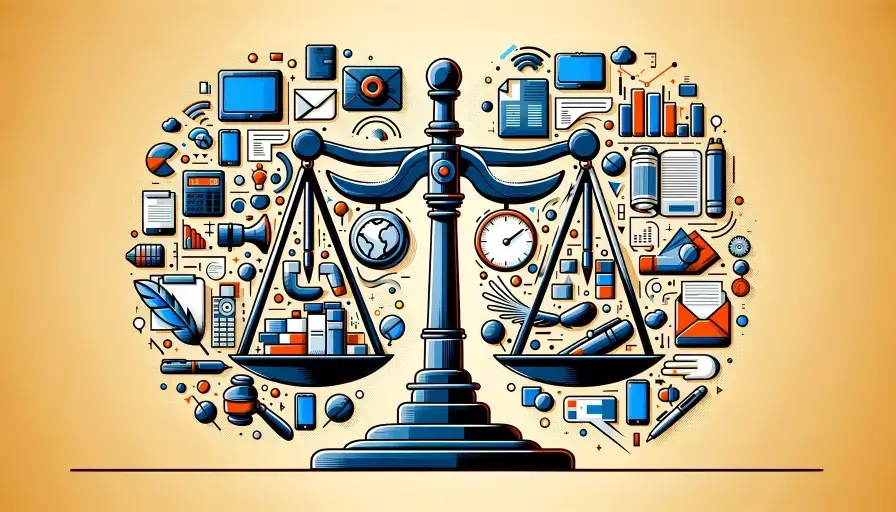In the dynamic landscape of the 21st century, journalism plays a pivotal role in shaping public discourse, holding power accountable, and facilitating informed citizenship.
With the progress of technology and society’s changing standards, the role of journalism has broadened its scope to include various platforms and viewpoints.
The piece examines the changing field of journalism, analyzes its influence on democracy, and addresses the difficulties and possibilities journalists encounter.
Understanding the Role of Journalism in the 21st Century
In the digital age, journalism’s essence and challenges have evolved significantly. Gone are the days when journalism was solely about reporting the news through traditional media.
Today, it stands as a beacon of democracy, navigating through the noise of the internet and social media to deliver accurate, impartial news. This blog post delves into the transformative role of journalism in the 21st century, highlighting its vital importance and the pressing need for journalistic integrity amidst a sea of misinformation.
Journalism’s responsibility has never been more pronounced. In an era of abundant information yet scarce accuracy, the journalist’s role as a verifier, a watchdog, and a guardian of the truth is crucial.
As we sift through the layers of digital content, the fundamental tenets of journalism—impartiality, objectivity, and ethical integrity—serve as our guiding stars.
These principles ensure that journalism remains a trustworthy source of information, empowering citizens with the knowledge needed to engage meaningfully in societal issues.
However, the path is fraught with challenges. The advent of digital platforms has enabled the extensive dissemination of information, resulting in the growth of citizen journalism.
While this has expanded the diversity of voices and perspectives, it has also blurred the lines between fact and opinion, between verified reporting and speculation.
Traditional journalism’s challenge in this new landscape is maintaining its credibility and authority by adhering to its core ethical standards, even as news delivery and consumption mechanisms undergo a radical transformation.
As we proceed, this blog will explore the intricacies of the role of journalism in shaping an informed, engaged, and democratic society, marking the exploration into the evolving landscape of the media industry.
We will examine the challenges of maintaining objectivity and impartiality, the impact of citizen journalism, and the ethical responsibilities that come with the journalist’s power to influence public discourse and political dialogue.
Fundamental Tenets and Importance of Journalism
Journalism is committed to truth, accountability, fairness, and the public interest. These fundamental tenets are ethical guidelines and pillars supporting journalism’s purpose in a democratic society. In an era where information is both a commodity and a tool, adherence to these principles becomes ever more critical.
Truth and Accuracy
Journalism’s defining characteristic and central role is its dedication to integrity and accuracy. In a world of information, the truth can often become obscured by noise, misinformation, and disinformation. Journalists are responsible for sifting through this information to uncover and report the truth as accurately as possible.
Verifying Facts: The verification process distinguishes journalism from other forms of content. Journalists use multiple sources, cross-check facts, and employ investigative techniques to ensure the accuracy of their reporting.
Challenges in the Digital Age: The rapid pace of digital media and abundant sources pose significant obstacles to truth and accuracy. Journalists must navigate this landscape carefully, balancing the need for timely reporting with the imperative for thorough verification.
Accountability and Transparency
Journalism is a vigilant overseer of authority, ensuring that individuals, organizations, and governments are held responsible for their actions. This role has expanded across newspaper, broadcast, and digital platforms. This function is crucial for democracy, as it ensures that those in positions of power are answerable to the public, highlighting the evolving role of the journalist in the 21st century.
- Ethical Reporting: Ethical journalism involves reporting the facts in a way that is fair and respectful to all involved. This includes acknowledging errors and correcting them promptly.
- Transparency: By being transparent about their sources, methods, and potential biases, journalists can build trust with their audience. This practice is increasingly important in the digital age, where every reporter is also an editor. Transparency also involves disclosing conflicts of interest that could affect the objectivity of reporting.
Fairness and Impartiality
Fairness and impartiality in reporting are essential for providing a balanced view of news events and issues. Journalism should represent diverse perspectives, especially those of marginalized or underrepresented communities.
- Avoiding Bias: While complete impartiality may be unattainable, journalists must actively work to recognize and mitigate their biases. This includes challenging assumptions and ensuring their reporting does not unfairly favor one perspective.
- Inclusive Reporting: Engaging with a wide range of voices and striving for inclusivity in reporting helps to provide a more comprehensive understanding of the issues at hand and the principles that guide this approach. This approach enriches the public discourse and fosters a more inclusive society, a testament to how the role of journalism has entered a new era of engagement and responsibility.
Serving the Public Interest
Ultimately, journalism’s primary duty is to serve the public interest. This involves reporting current events, objectively illuminating broader societal issues, contributing to public understanding, and empowering citizens through information.
- Informing the Public: High-quality journalism provides accurate and reliable information, empowering individuals to make well-informed choices regarding their personal lives, local communities, and governing bodies.
- Promoting Engagement: By providing analysis and context, journalism can encourage public engagement with societal issues, fostering an informed and active citizenry.
Challenges and Responsibilities in Modern Journalism
Journalists face a dual challenge in the labyrinth of the 21st-century media landscape: navigating the complexities of a rapidly evolving digital world while steadfastly adhering to the age-old ethical standards that define their profession. The digital age has democratized information dissemination, empowering citizen journalists and creating a diverse array of voices. Yet, this democratization also highlights the critical challenge of maintaining journalistic integrity.
Navigating the Digital Wave
Social media and digital platforms have revolutionized reporting, consuming, and sharing news. Information now travels faster than ever, reaching global audiences with the click of a button. However, this ease of access and speed also means that misinformation can spread just as rapidly, blurring the lines between fact and fiction. In this context, the journalist’s role as a truth verifier becomes paramount. Journalists must exercise rigorous fact-checking and adhere to stringent verification processes to ensure that the information they disseminate is accurate and reliable.
The Ethical Balancing Act
Amidst the pressure to be the first to break news in a 24/7 news cycle, journalists must navigate the thin line between speed and accuracy, public interest, and sensationalism. The core ethical standards of impartiality, objectivity, and fairness are more relevant than ever. Journalists must remain independent and free from political or corporate influences that could compromise their reporting. This independence is crucial for maintaining public trust—a commodity as valuable as the news.
Citizen Journalism: A Double-Edged Sword
The rise of citizen journalism has introduced new voices and perspectives into the public discourse, offering a grassroots approach to news reporting. However, it also presents challenges in terms of quality control and bias. Professional journalists are responsible for mentoring and guiding citizen journalists toward upholding journalistic standards and fostering a culture of accuracy and accountability.
The Responsibility of Digital Platforms
As gatekeepers of information, digital platforms and social media firms are vital in disseminating news. There is a growing call for these entities to take responsibility for curbing the spread of misinformation, working with journalists and media organizations to create a more informed and discerning public.
Journalism’s transformation in the digital era is not just about adopting new technologies but also about reinforcing the profession’s ethical backbone. Journalists and media organizations must rise to the occasion, ensuring that the digital age of journalism remains a force for truth, democracy, and societal progress.
The Transformative Potential of Journalism
The 21st century has underscored journalism’s transformative power, not just as a conduit for information but as a catalyst for societal change. Amidst the challenges of maintaining integrity in the digital age, journalism’s potential to foster peace, justice, and an informed society remains its most compelling attribute.
Fostering Peace and Justice
Journalism plays a pivotal role in highlighting issues of injustice and inequality, often bringing to light stories that would otherwise remain hidden. Through investigative reporting and dedicated coverage, journalists can galvanize public opinion and spur action toward addressing societal wrongs, embodying the future of journalism. This aspect of journalism informs and unites individuals in common causes, promoting peace and advocating for justice on local, national, and global scales.
Building an Informed Society
At its core, journalism is about education and enlightenment. By providing context, analysis, and diverse perspectives on events and issues, journalists help build a more informed society, a task increasingly challenging in the rapidly shifting media industry.
This function is crucial in an age where information overload can lead to confusion and apathy, underscoring the importance of a discerning edit process in journalism. Quality journalism cuts through the noise, offering clarity and promoting critical thinking among its audience. An informed public is better equipped to make decisions, participate in democratic processes, and contribute to meaningful societal progress.
The Ethical Imperative
As journalism navigates the complexities of the digital era, the ethical imperative of the profession comes into sharp focus. Journalists must remain steadfast in their commitment to truth, accuracy, and fairness.
This ethical foundation guides journalistic practice and serves as a trust-building mechanism with the audience. In a time when trust in media is both precious and precarious, upholding these values is essential for the sustainability of journalism itself.
Embracing Technology for Good
While technology challenges traditional journalism, it also offers unparalleled opportunities to enhance it. Tools for data analysis, digital storytelling, and audience engagement can enrich reporting, making it more accessible and impactful.
By embracing these tools responsibly, journalists can further the reach and effectiveness of their work, ensuring that journalism continues to serve as a pillar of democratic society.
In conclusion, the role of journalism in the 21st century is as critical as ever. Despite facing unprecedented challenges, the profession holds the potential to transform society for the better. By upholding ethical standards, embracing technological advancements, and focusing on journalism’s fundamental goals, journalists can continue to impact the world profoundly.
Striving for Independence and Objectivity
In the landscape of 21st-century journalism, the twin pillars of independence and objectivity are both a beacon and a battleground for journalists worldwide. As the digital era unfolds, these principles are tested by unprecedented challenges, yet their importance has only grown.
This section explores the essence of journalistic independence and the ongoing quest for objectivity, highlighting their crucial role in fostering a democratic society.
Independence: The Foundation of Trust
Journalistic independence is the bedrock of trust between the media and the public. Independence means that journalists and media organizations operate free from influence by government, political parties, corporate interests, or other external pressures.
This autonomy is crucial for ensuring that the news reported, whether through newspaper, broadcast, or online, is not swayed by the agendas of powerful entities but instead focused on serving the public interest.
- Challenges to Independence: In today’s media environment, economic pressures, such as the dependence on advertising revenue and the financial interests of media owners, can threaten journalistic independence. Similarly, political pressures and online harassment campaigns against journalists pose significant challenges.
- Safeguarding Independence: News organizations must adhere to rigorous editorial standards and maintain clear separations between editorial content and commercial or political interests to protect their independence. Journalistic codes of ethics and the support of press freedom organizations are also vital in defending against attempts to undermine journalistic autonomy.
Objectivity: Navigating Complex Realities
Objectivity in journalism seeks to present information and news without bias, allowing the audience to judge based on facts. While achieving complete objectivity may be an ideal rather than a practical reality, striving for it is essential in maintaining the credibility and integrity of journalism.
- Objectivity vs. Bias: Recognizing that every journalist brings their perspectives and biases to their work, the objective approach involves rigorous fact-checking, presenting multiple viewpoints, and distinguishing between reporting and opinion. The Role of
- Fact-Checking: In the age of misinformation, independent fact-checking has become increasingly critical. Fact-checking initiatives and the incorporation of fact-checking processes within newsrooms help ensure that reports are grounded in verifiable information.
The Path Forward
As journalism evolves, independence and objectivity remain central to its mission. Embracing transparency about the reporting process, engaging in self-reflection, and fostering a culture of ethical journalism are critical steps in navigating the challenges of the digital age.
Through dedicated efforts to uphold these standards, journalists can continue to inform, educate, and empower the public, contributing to the health and vitality of democratic societies worldwide.
Conclusion: Upholding the Indispensable Role of Journalism
As we navigate through the 21st century, the role of journalism has never been more critical. Amidst a time characterized by swift technological progress, deep political divisions, and overwhelming information, the need for precise, unbiased, and morally upright journalism emerges as a guiding light for democracy and societal advancement.
Journalism’s essence lies in its ability to inform, educate, and mobilize. It serves not just as a mirror reflecting the world’s complexities but as a force capable of driving change and fostering a more informed, just, and peaceful society.
The challenges of digital disruption and the rise of misinformation have only underscored the importance of maintaining journalistic integrity and the pursuit of truth.
As readers, citizens, and global community members, our support for responsible journalism is paramount. By valuing and defending the principles of impartiality, objectivity, and accountability, we contribute to a healthier public discourse and a more robust democracy. Our collective efforts to seek and support quality journalism can ensure this noble profession’s enduring value.
In closing, let us remember that the role of journalism, at its best, is a testament to the human spirit’s quest for truth and justice. As we look forward to the future, let us uphold the ideals of journalism, recognizing its essential role in shaping a better world for generations to come, marking the path for the future of journalism.
FAQS.
Q: What is the role of journalism in promoting democracy in the 21st century?
Journalism promotes democracy by investigating, reporting, and distributing news, fostering informed citizens, and acting as a watchdog to ensure government accountability and transparency. Thus, journalism strengthens democratic institutions and promotes participatory democracy.
Q: How has the rise of digital and social media impacted the future of journalism?
The rise of digital and social media has transformed journalism by shifting news consumption from traditional print media to online platforms, introducing “citizen journalism,” where citizens contribute directly. This democratization has led to increased distrust and challenges in maintaining impartiality in the news media sphere.
Q: What challenges do journalists face in maintaining impartiality today?
Journalists face challenges maintaining impartiality due to the proliferation of news outlets, media influence, and corporate imperialism. The temptation to increase viewership through sensationalism and rapid news publishing on social media complicates balanced reporting, requiring them to uphold ethical standards.
Q: Can a career in journalism still be pursued in the age of digital media and “citizen journalism”?
Despite digital media challenges and citizen journalism, journalism remains a rewarding career. Journalists must adapt to multimedia reporting and use digital tools for storytelling. Professional journalism is crucial for curation, verification, and in-depth analysis of news stories. Young journalists can find opportunities in investigative journalism and fact-checking platforms.
Q: How are traditional print media outlets adapting to the digital transformation?
Traditional print media outlets are adapting to digital transformation by embracing online publishing, developing mobile applications, and engaging audiences through social media. They focus on digital subscriptions and advertising, investing in multimedia journalism to enhance storytelling and meet changing consumption habits. Some maintain print editions with reduced frequency.
Q: What is the importance of globalization in the context of journalism’s role in the 21st century?
Globalization influences journalism by facilitating news flow across borders, allowing journalists to report on international issues and provide global perspectives. Advancements in technology and communication enable news stories to reach worldwide audiences but also present challenges like navigating different cultures and political landscapes.
Q: How should journalists address the issue of distrust in the news media?
Journalists can combat distrust in the news media by upholding high standards of accuracy, fairness, and ethical conduct. Transparency, context, fact-checking, and timely corrections can rebuild trust. Engaging with the audience and training programs can prepare future journalists to navigate the media landscape effectively.









